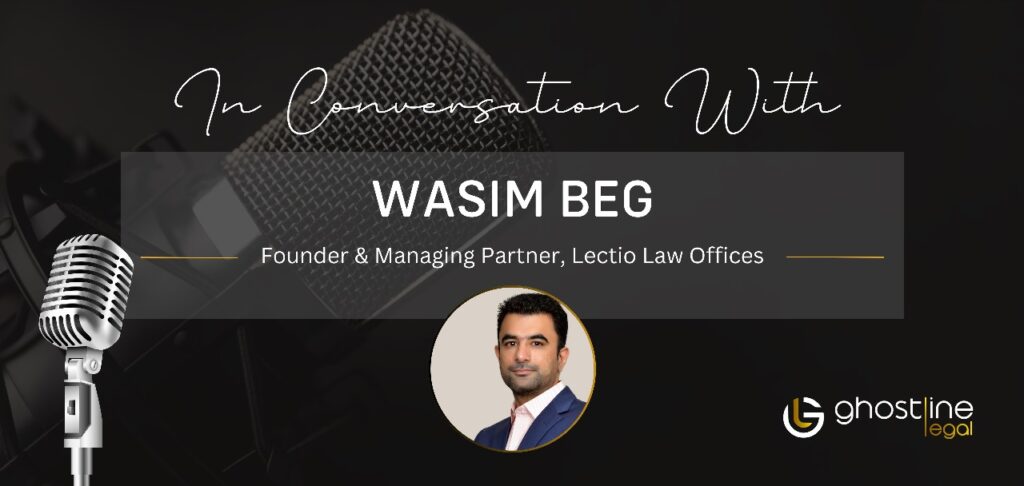Mr. Wasim Beg is a distinguished legal professional and a former Partner at Luthra and Luthra Law Offices India, a leading full-service law firm renowned for its excellence in providing comprehensive legal solutions. With a career spanning over 16 years, Mr. Beg has earned a reputation for his expertise in various branches of law, making him a versatile and accomplished legal practitioner. He is currently the Founder & Managing Partner at Lectio Law Offices.
Mr. Beg’s areas of specialization include Constitutional Law, Criminal Law, Civil Law, Labour Law, Employment Law, Extradition Law, Commercial Law, and Tenancy Law, showcasing the breadth of his legal knowledge and experience. His commitment to delivering high-quality legal services has contributed significantly to the success of Luthra and Luthra Law Offices.
After almost two decades of advocacy, how would you define the impact that technology has had on litigation?
Wasim: The young lawyer of the day cannot imagine a world without the use of technology – can he? The research starts with the use of technology, spills into your drafting and finds its way into your laptops and from there to the Court rooms. There can be no denying that technology has made things much easier.
Two of the biggest gains are the reduction in use of paper and the introduction of hearings through video conferencing. I feel that hearings of a certain kind (we could arrive at a pecuniary limit/base it on the classification of the offence or any other criteria) should be mandatorily held through video conferencing. This step will go a long way in ensuring that justice is delivered and made available at the citizen’s door-step.
The use of Artificial Intelligence for research, legal writing and drafting should be avoided. While technology has contributed a great deal in making things easier and more robust, one must be wary of the trappings like the use of Artificial Intelligence and the fact that nothing can ever replace the books – one must not lose that habit of reading.
In what ways would you like to give an account of your experience working alongside the eminent Senior Advocate, the Late Mr. Ram Jethmalani?
Wasim: I asked him what would be the one thing he would tell a young lawyer and he asked me to bring a pen and paper. He wrote ‘So conduct yourself that even if you lose your case you don’t lose your conscience’.
A man of his eminence could have said many a things and he chose those words for a reason. Everyone sets-out targeting success and excellence, what sets you apart and makes you great is the legacy that you leave behind. This is the mantra he lived by – he was never answerable to anyone but his conscience. He would go against public opinion and perception when his conscience would tell him to.
What is your opinion on the current tendency among the budding lawyers to begin their practice from the High Courts, instead of starting from scratch?
Wasim: I do not have strong or rigid opinions on the definition of success. There are various paths that one may take to success. The only constant being that there are no short-cuts on this path. Hard-work has no alternative.
It is certainly advisable to start with the District Courts for the base must always be strong. However, I strongly believe that what is more important is to have a clear mind – one that is free of any doubts. If you know what you are doing, if you are confident in what you are doing – that is half the job done.
Amidst the court appearances for complex matters on a regular basis, you are also a prolific writer on legal issues. How do you manage to strike a balance between these two roles?
Wasim: I have always made it a point to find time for myself. Writing is one of the hobbies I indulge in when not working. Also, the matters that I am working on and the topics that I write on are often inter-connected. So, one (my writing)) is often the extension of the other (the cases that I am working on).
What were the points of law argued while representing an international bank before the Honourable Supreme court of India for executing a foreign decree granted by the Queen’s Bench Division, High Court of Justice, United Kingdom?
Wasim: The matter dealt with the challenges that the Decree Holder faces while executing a foreign decree (from a reciprocating territory) in India. We appeared for the Decree Holder. The Judgment Debtor, in an effort to deprive the Decree Holder from executing the Decree was essentially opening-up the very basis on which the Decree was passed in the foreign Court. The arguments primarily revolved around Section 13 of the CPC which lists out the instances when a foreign Judgment can be held inconclusive and that the attempts of the Judgment Debtor to go into the merits of the case as conducted in the foreign Court would amount to going behind the Decree which was argued and held to be impermissible.
Since you have transitioned from a partner to a founder of a firm what would be the determining criteria for you to recruit people?
Wasim: It depends on the vacancy that we are looking to fill-up. The criteria for a fresher will be different from what is expected from a lawyer who is five years into the profession. One common aspect that we look at is the willingness/keenness to work and (importantly) contribute. I prefer intelligence over knowledge. That is not to say that a mix of both won’t be preferred.
Would you take to social media platforms for knowledge-sharing as per the recent trends?
Wasim: I do acknowledge the role social media plays in reaching-out to the larger audience. I might have been the beneficiary of the same. However, I like to discuss in-person and seek views while sharing knowledge or sharing my views on a subject. It is always more fascinating and raw that way. An exchange of ideas and thoughts is always a better way of learning and making people learn, and it also helps one retain a lot more. Ergo, knowledge sharing through social media platforms is effective but nothing compares to in-person discussions.
What would you encourage- quantity or quality of work experiences while building a resume?
Wasim: The quality for sure. There can be no doubt in this. As Steve Jobs once said ‘Quality is much better than Quantity. One home run is much better than two doubles.’








